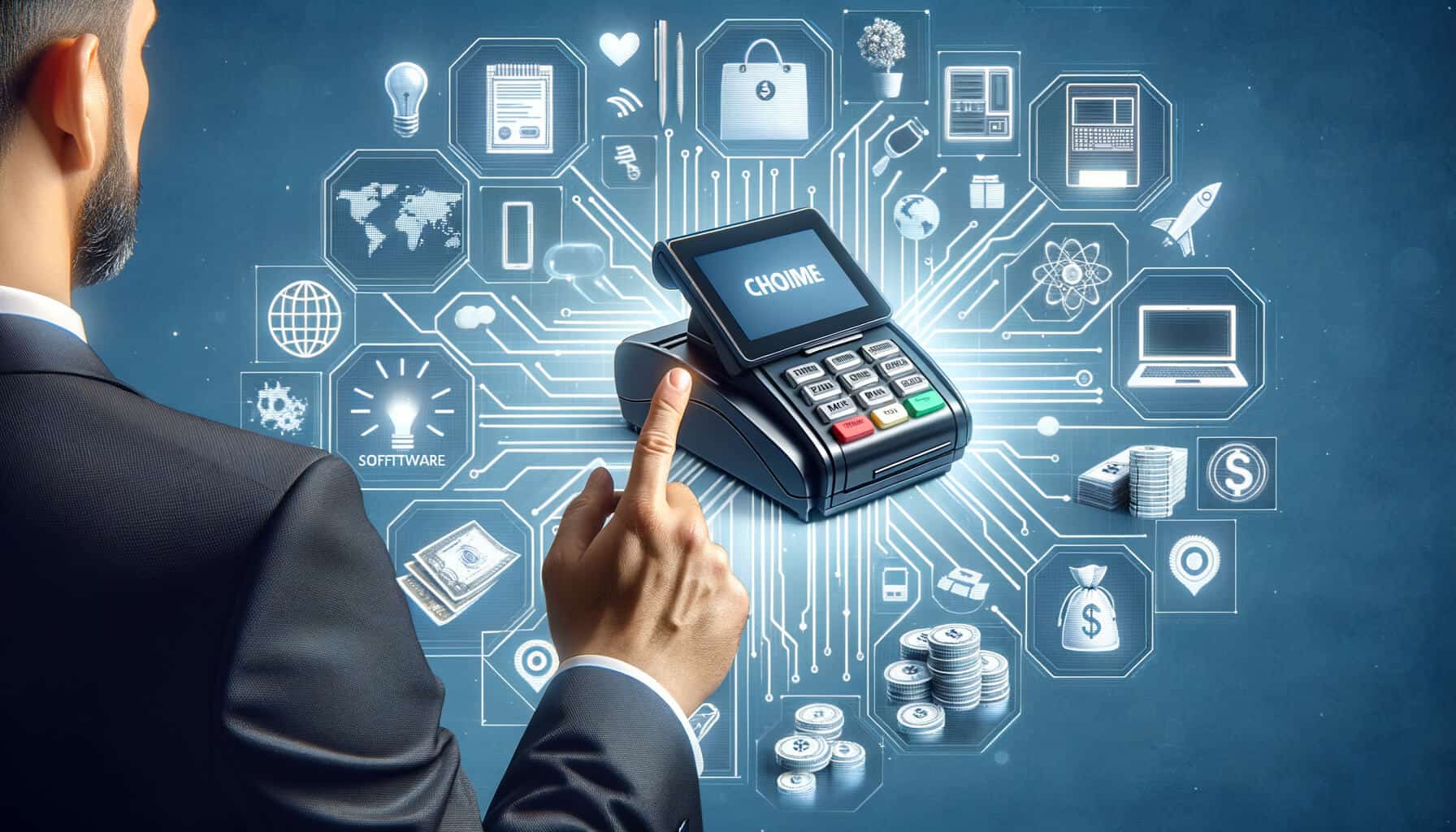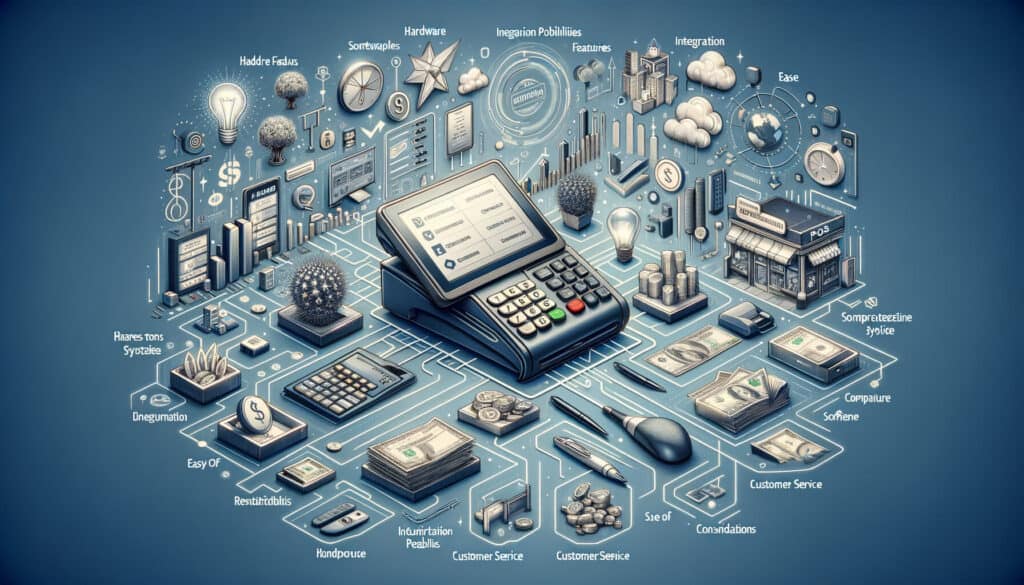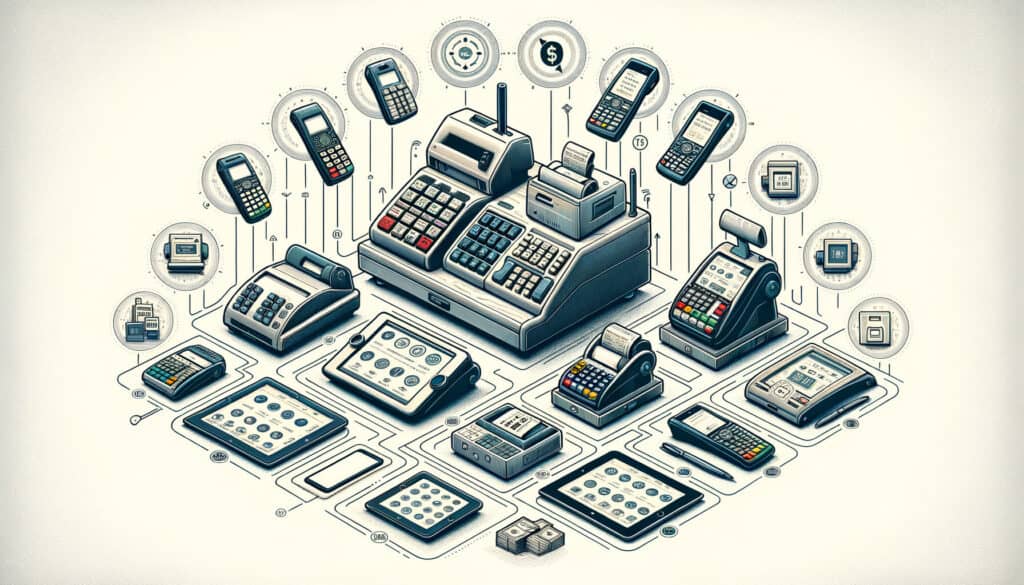
By Carol Peters November 11, 2024
In today’s fast-paced business environment, having an efficient and reliable Point of Sale (POS) system is crucial for the success of any retail or hospitality establishment. A POS system is a combination of hardware and software that allows businesses to process transactions, manage inventory, track sales, and generate reports. It serves as the central hub for all sales-related activities, making it an essential tool for streamlining operations and improving customer service.
The importance of a Point of Sale (POS) system cannot be overstated. It not only simplifies the checkout process but also provides valuable insights into customer behavior, inventory management, and sales performance. With the right POS system in place, businesses can make data-driven decisions, optimize their operations, and ultimately increase their profitability.
Factors to Consider When Choosing a Point of Sale (POS) System

When it comes to choosing a Point of Sale (POS) system for your business, there are several factors that you need to consider. Each business has unique needs and requirements, so it’s important to assess these factors before making a decision. Here are some key factors to consider:
- Business Type and Size: The first step in choosing a POS system is to understand your business type and size. Different industries have different requirements, so it’s important to choose a system that is tailored to your specific needs. For example, a restaurant would require a Point of Sale (POS) system with table management and kitchen printing capabilities, while a retail store would need a system with barcode scanning and inventory management features.
- Scalability: It’s important to choose a POS system that can grow with your business. As your business expands, you may need to add more registers, locations, or even integrate with other systems. Therefore, it’s crucial to choose a system that is flexible and can accommodate future growth.
- Ease of Use: A user-friendly interface is essential for a smooth checkout process and efficient operations. Look for a Point of Sale (POS) system that is intuitive and easy to navigate, as this will reduce training time and minimize errors.
- Integration with Other Systems: Consider the other systems and software that you currently use or plan to use in the future. It’s important to choose a POS system that can seamlessly integrate with these systems, such as accounting software, e-commerce platforms, or customer relationship management (CRM) tools. Integration eliminates the need for manual data entry and ensures accurate and up-to-date information across all systems.
- Reporting and Analytics: A good Point of Sale (POS) system should provide robust reporting and analytics capabilities. Look for a system that can generate detailed reports on sales, inventory, employee performance, and customer behavior. These insights will help you make informed decisions and identify areas for improvement.
Assessing Your Business Needs: Determining the Right Features and Functionality
Once you have considered the general factors, it’s time to assess your specific business needs and determine the features and functionality that are essential for your operations. Here are some key areas to consider:
- Sales and Checkout Process: Evaluate the features related to the sales and checkout process. This includes the ability to process different types of payments, such as cash, credit cards, and mobile payments. Look for features like split payments, discounts, and refunds. Consider whether you need features like barcode scanning, receipt printing, or customer-facing displays.
- Inventory Management: Inventory management is crucial for businesses that sell physical products. Look for a POS system that can track inventory levels, manage stock across multiple locations, and generate purchase orders when stock is low. Consider whether you need features like stock alerts, product variations, or serialized inventory tracking.
- Customer Relationship Management (CRM): If building strong customer relationships is important for your business, consider a Point of Sale (POS) system with CRM capabilities. Look for features like customer profiles, loyalty programs, and targeted marketing campaigns. Consider whether you need features like email marketing integration or customer feedback management.
- Employee Management: If you have a large team, consider a POS system with employee management features. Look for features like time clock integration, scheduling, and performance tracking. Consider whether you need features like commission tracking or role-based access control.
- Reporting and Analytics: As mentioned earlier, reporting and analytics are crucial for making data-driven decisions. Look for a Point of Sale (POS) system that can generate detailed reports on sales, inventory, employee performance, and customer behavior. Consider whether you need features like customizable dashboards or real-time reporting.
Types of Point of Sale (POS) Systems: Finding the Best Fit for Your Business

Now that you have assessed your business needs, it’s time to explore the different types of Point of Sale (POS) systems available in the market. There are several types of POS systems, each with its own set of features and functionalities. Here are the most common types:
- Traditional On-Premise POS Systems: Traditional on-premise Point of Sale (POS) systems consist of hardware and software that are installed on-site. These systems are typically more expensive upfront but offer more control and customization options. They require a dedicated server and may require IT support for maintenance and updates.
- Cloud-Based POS Systems: Cloud-based POS systems, also known as Software-as-a-Service (SaaS) Point of Sale (POS) systems, are hosted in the cloud and accessed through the internet. These systems are more affordable upfront and offer greater flexibility and scalability. They are easy to set up and require minimal IT support. Updates and maintenance are handled by the POS system provider.
- Mobile POS Systems: Mobile Point of Sale (POS) systems are designed to run on mobile devices like tablets or smartphones. These systems are ideal for businesses that require mobility, such as food trucks or pop-up shops. They offer flexibility and can be easily set up anywhere with an internet connection. Mobile POS systems are often cloud-based and offer similar features to traditional Point of Sale (POS) systems.
- Self-Service Kiosks: Self-service kiosks are becoming increasingly popular in industries like fast food, retail, and hospitality. These kiosks allow customers to place orders, make payments, and even customize their orders. Self-service kiosks can be integrated with POS systems to streamline operations and reduce wait times.
When choosing the type of Point of Sale (POS) system that is best for your business, consider factors like cost, scalability, ease of use, and the specific needs of your industry.
Evaluating the Cost and Pricing Models of POS Systems

Cost is an important consideration when choosing a Point of Sale (POS) system for your business. The cost of a POS system can vary depending on factors like the type of system, the number of registers or locations, and the features and functionalities included. Here are some common cost considerations:
- Upfront Costs: Traditional on-premise POS systems often require a significant upfront investment. This includes the cost of hardware, software licenses, and installation. Cloud-based Point of Sale (POS) systems and mobile POS systems, on the other hand, typically have lower upfront costs as they require minimal hardware and software.
- Subscription Fees: Cloud-based Point of Sale (POS) systems usually operate on a subscription-based pricing model. This means that you pay a monthly or annual fee to access the system. The subscription fee often includes software updates, maintenance, and customer support. The cost of the subscription fee can vary depending on factors like the number of registers or locations and the features included.
- Transaction Fees: Some POS system providers charge transaction fees for each sale processed through their system. These fees are typically a percentage of the transaction value. Transaction fees can add up, especially for businesses with high sales volumes. It’s important to consider these fees when evaluating the overall cost of a Point of Sale (POS) system.
- Additional Costs: In addition to upfront costs and subscription fees, there may be additional costs associated with a POS system. These can include hardware upgrades, integrations with other systems, training, and support. It’s important to factor in these costs when budgeting for a Point of Sale (POS) system.
When evaluating the cost of a POS system, it’s important to consider the return on investment (ROI) that the system can provide. A well-implemented Point of Sale (POS) system can help businesses increase sales, reduce costs, and improve efficiency, ultimately leading to a positive ROI.
Researching and Comparing Different POS System Providers
Once you have determined your business needs and assessed the cost considerations, it’s time to research and compare different POS system providers. There are numerous providers in the market, each offering a range of features, pricing models, and customer support. Here are some steps to help you in your research:
- Read Reviews and Testimonials: Start by reading reviews and testimonials from other businesses that have used the Point of Sale (POS) system you are considering. Look for reviews on reputable websites and forums. Pay attention to both positive and negative feedback to get a balanced view of the system’s strengths and weaknesses.
- Request Demos and Trials: Most POS system providers offer demos or free trials of their systems. Take advantage of these opportunities to test the system’s features and functionalities. Pay attention to the user interface, ease of use, and the specific features that are important for your business.
- Consider Industry-Specific Solutions: Some Point of Sale (POS) system providers specialize in specific industries, such as restaurants, retail, or hospitality. These providers often offer industry-specific features and integrations that can streamline operations and improve efficiency. Consider whether an industry-specific solution would be beneficial for your business.
- Evaluate Customer Support: Customer support is crucial when it comes to POS systems. Look for a provider that offers 24/7 support and multiple channels of communication, such as phone, email, and live chat. Consider whether the provider offers training resources, documentation, or a knowledge base to help you get started and troubleshoot issues.
- Check Integration Capabilities: As mentioned earlier, integration capabilities are important for seamless operations. Check whether the Point of Sale (POS) system can integrate with other systems and software that you currently use or plan to use in the future. Consider whether the provider offers pre-built integrations or an open API for custom integrations.
Understanding the Integration Capabilities of a POS System
Integration capabilities are a crucial factor to consider when choosing a POS system for your business. Integrations allow different systems to communicate and share data, eliminating the need for manual data entry and ensuring accurate and up-to-date information. Here are some key integration capabilities to consider:
- Accounting Software Integration: Integrating your Point of Sale (POS) system with accounting software can streamline financial processes and eliminate manual data entry. Look for a POS system that can integrate with popular accounting software like QuickBooks or Xero. Consider whether the integration supports features like automatic syncing of sales data, inventory updates, and financial reporting.
- E-commerce Integration: If you sell products online, it’s important to choose a Point of Sale (POS) system that can integrate with your e-commerce platform. Look for a system that can sync inventory levels, process online orders, and update product information across all channels. Consider whether the integration supports features like order tracking, customer synchronization, and real-time inventory updates.
- CRM Integration: Integrating your POS system with a CRM tool can help you build strong customer relationships and personalize the shopping experience. Look for a Point of Sale (POS) system that can sync customer data, purchase history, and loyalty program information with your CRM. Consider whether the integration supports features like targeted marketing campaigns, customer segmentation, and personalized recommendations.
- Payment Processor Integration: Payment processor integration is essential for processing different types of payments, such as credit cards, mobile payments, or gift cards. Look for a Point of Sale (POS) system that can integrate with popular payment processors like PayPal, Stripe, or Square. Consider whether the integration supports features like split payments, refunds, or recurring billing.
- Inventory Management Integration: If you use inventory management software, it’s important to choose a POS system that can integrate with it. Look for a system that can sync inventory levels, track stock across multiple locations, and generate purchase orders. Consider whether the integration supports features like stock alerts, product variations, or serialized inventory tracking.
When evaluating the integration capabilities of a Point of Sale (POS) system, consider the specific systems and software that you currently use or plan to use in the future. Choose a system that offers pre-built integrations or an open API for custom integrations.
Security and Data Protection: Ensuring the Safety of Your Business and Customers
Security and data protection are paramount when it comes to choosing a POS system for your business. A breach in security can not only result in financial losses but also damage your reputation and erode customer trust. Here are some key security considerations:
- Payment Card Industry Data Security Standard (PCI DSS) Compliance: PCI DSS is a set of security standards that all businesses that process, store, or transmit credit card information must comply with. When choosing a Point of Sale (POS) system, ensure that it is PCI DSS compliant. This means that the system meets the necessary security requirements to protect cardholder data.
- Encryption and Tokenization: Look for a POS system that uses encryption and tokenization to protect sensitive data. Encryption ensures that data is securely transmitted between the Point of Sale (POS) system and the payment processor. Tokenization replaces sensitive data, such as credit card numbers, with unique tokens, reducing the risk of data theft.
- User Access Control: User access control is important for preventing unauthorized access to the POS system. Look for a system that offers role-based access control, allowing you to assign different levels of access to different users. This ensures that only authorized personnel can access sensitive data or perform certain actions.
- Data Backup and Recovery: Choose a POS system that offers regular data backups and a robust disaster recovery plan. This ensures that your data is protected in the event of hardware failure, natural disasters, or other unforeseen circumstances. Consider whether the provider offers off-site backups or cloud-based storage.
- Security Updates and Patches: Security threats are constantly evolving, so it’s important to choose a Point of Sale (POS) system that regularly updates its software and patches vulnerabilities. Look for a provider that has a dedicated security team and a track record of promptly addressing security issues.
Training and Support: Ensuring a Smooth Transition and Ongoing Assistance
Training and support are critical aspects of implementing a Point of Sale (POS) system successfully. A smooth transition and ongoing assistance ensure that your staff can effectively use the system, minimize errors, and maximize the system’s benefits. Here are the key considerations for training and support:
- Training Materials: Look for a Point of Sale (POS) system that provides comprehensive training materials, such as user manuals, video tutorials, and knowledge bases. These resources should cover all aspects of using the POS system, from basic operations to advanced features. Evaluate the quality and accessibility of the training materials to ensure that your staff can easily access and understand them.
- Onboarding Assistance: Consider the level of onboarding assistance provided by the POS vendor. Some vendors offer personalized onboarding sessions where a representative guides you through the setup process and trains your staff. Onboarding assistance can help you get up and running quickly and ensure that you configure the system correctly for your business needs.
- Ongoing Support: Evaluate the level of ongoing support provided by the POS vendor. Look for vendors that offer multiple support channels, such as phone, email, and live chat. Consider the availability of support, including response times and hours of operation. Additionally, evaluate the expertise and helpfulness of the support team to ensure that you can rely on them for timely assistance.
- Software Updates: Regular software updates are essential for maintaining system security, adding new features, and addressing any bugs or issues. Look for a Point of Sale (POS) vendor that regularly releases updates and communicates these updates to their customers. Consider the ease of updating the software and any potential downtime or disruptions during the update process.
- User Permissions and Security: Training should include guidance on user permissions and security best practices. Ensure that the POS system allows you to define user roles and permissions to control access to sensitive data and system settings. Training should cover topics like password management, data security, and fraud prevention.
- Ongoing Training Opportunities: As your business evolves and new features are added to the POS system, ongoing training opportunities become crucial. Look for a Point of Sale (POS) vendor that offers regular webinars, workshops, or training sessions to keep your staff up to date with the latest features and best practices. Ongoing training ensures that you can fully leverage the capabilities of the Point of Sale (POS) system and adapt to changing business needs.
Training and support are essential for a successful POS system implementation. Investing in comprehensive training and ongoing support will ensure that your staff can use the system effectively, minimize errors, and maximize the system’s benefits. When evaluating Point of Sale (POS) systems, consider the level of training and support provided by the vendor and ensure that it aligns with your business requirements.
FAQs
Q1. What is a Point of Sale (POS) system?
A Point of Sale (POS) system is a combination of hardware and software that allows businesses to process transactions, manage inventory, and track sales. It serves as the central hub for all sales-related activities, providing real-time data and insights.
Q2. How much does a POS system cost?
The cost of a POS system can vary depending on factors such as the type of system, the number of terminals required, and the features and functionalities included. Traditional on-premise systems can have higher upfront costs, while cloud-based systems operate on a subscription-based model.
Q3. What are the benefits of a POS system?
A POS system streamlines operations, improves customer service, and enhances overall efficiency. It automates routine tasks, reduces human error, and provides valuable insights into sales and inventory.
Q4. Can a Point of Sale (POS) system integrate with existing systems?
Yes, a Point of Sale (POS) system can integrate with existing systems such as payment processors, inventory management systems, accounting software, CRM systems, and e-commerce platforms. Integration eliminates the need for manual data entry and ensures that all systems are working together harmoniously.
Q5. What type of POS system is best for my business?
The best type of POS system for your business depends on factors such as your industry, business size, mobility requirements, and budget. Traditional on-premise systems offer customization and control, while cloud-based systems offer affordability and flexibility. Mobile Point of Sale (POS) systems are ideal for businesses that require mobility, while self-service kiosks are suitable for industries such as fast food and retail.
Conclusion
Choosing the right POS system for your business is a critical decision that can have a significant impact on your operations and bottom line. By considering factors such as your business type and size, ease of use, integration capabilities, and cost, you can find a Point of Sale (POS) system that meets your specific needs.
Whether you opt for a traditional on-premise system, a cloud-based solution, or a mobile Point of Sale (POS) system, investing in a reliable and efficient POS system will help streamline your operations, improve customer service, and drive business growth.
